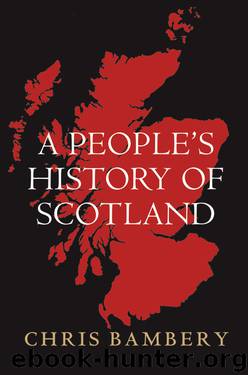A People's History of Scotland by Chris Bambery

Author:Chris Bambery
Language: eng
Format: epub, mobi
Publisher: Verso Books
ELEVEN
The Great Depression:
Suffering and Resistance
Another day thus upon the mountain
And great Scotland under the doom of beasts
Her thousands of poor exploited
Beguiled to a laughing stock,
Flattered, deceived and anointed
By the nobles and the godly bourgeois
Who make a bourgeois of Christ
– Sorley MacLean
‘The Cuillin’
The 1930s were a decade of unemployment, sub-standard housing and poor levels of health in Scotland. Glasgow acquired many of the negative stereotypes still attached to it: a centre for drink, razor gangs and religious sectarianism, as portrayed in Alexander MacArthur and Herbert Kingsley Long’s 1935 novel No Mean City. One contemporary report described the unemployed in these words: ‘With drooping shoulders and slouching feet they moved as a defeated and dispirited army. They gave their names, signed the necessary forms and shuffled out of the Exchange. This, twice a week, was the only disciplined routine with which they had to comply.’1
After the Wall Street Crash of 1929, unemployment in Scotland reached a quarter of the workforce in 1931–33. The UK average was a fifth, although until 1933 unemployment levels in north-east England were worse than in Scotland. Despite rearmament bringing jobs in the late 1930s, Scotland’s jobless total was a third higher than the UK average.2
Throughout the 1920s, unemployment never dropped below 10 percent of Scotland’s workforce, but in the ’30s it averaged over 20 percent. Motherwell and Wishaw had unemployment rates of 49 percent and 53 percent respectively during late 1932 and early 1933.3 The demoralisation caused by long-term unemployment left deep scars, and came as a shock to skilled workers who had never been out of work for any length of time before.4
The Orcadian poet and socialist Edwin Muir toured Scotland in 1933 and wrote of the idle shipyards:
The weather had been good for several weeks, and all the men I saw were tanned and brown as if they had just come back from their summer holidays. They were standing in their usual groups, or walking by twos and threes, slowly, for one felt as one looked at them that the world had not a single message to send them on, and that for them to hasten their steps would have meant a sort of madness. Perhaps at some time the mirage of work glimmered at the extreme horizon of their minds but one could see by looking at them that they were no longer deceived by such false pictures.5
Download
A People's History of Scotland by Chris Bambery.mobi
This site does not store any files on its server. We only index and link to content provided by other sites. Please contact the content providers to delete copyright contents if any and email us, we'll remove relevant links or contents immediately.
| Arms Control | Diplomacy |
| Security | Trades & Tariffs |
| Treaties | African |
| Asian | Australian & Oceanian |
| Canadian | Caribbean & Latin American |
| European | Middle Eastern |
| Russian & Former Soviet Union |
The Secret History by Donna Tartt(19032)
The Social Justice Warrior Handbook by Lisa De Pasquale(12183)
Thirteen Reasons Why by Jay Asher(8884)
This Is How You Lose Her by Junot Diaz(6872)
Weapons of Math Destruction by Cathy O'Neil(6261)
Zero to One by Peter Thiel(5782)
Beartown by Fredrik Backman(5734)
The Myth of the Strong Leader by Archie Brown(5491)
The Fire Next Time by James Baldwin(5424)
How Democracies Die by Steven Levitsky & Daniel Ziblatt(5211)
Promise Me, Dad by Joe Biden(5141)
Stone's Rules by Roger Stone(5079)
A Higher Loyalty: Truth, Lies, and Leadership by James Comey(4946)
100 Deadly Skills by Clint Emerson(4911)
Rise and Kill First by Ronen Bergman(4776)
Secrecy World by Jake Bernstein(4738)
The David Icke Guide to the Global Conspiracy (and how to end it) by David Icke(4697)
The Farm by Tom Rob Smith(4500)
The Doomsday Machine by Daniel Ellsberg(4481)
